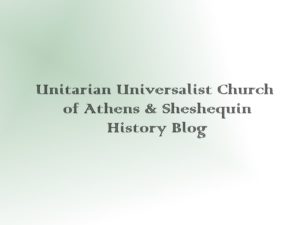Last month I wrote about a namesake of the Rev. Myra Kingsbury. The Rev. Noah Murray, the first Universalist preacher in Bradford county, also had a namesake – a great-grandson who followed in his footsteps as a Universalist preacher.
Noah Murray’s daughter Sylvia married Lemuel Gaylord in 1791. In 1814 the Gaylords moved to Hamilton county, Ohio. There their son, Orange Gaylord, and his wife Hannah Holcomb had their first child, a son, in 1823. They named him Noah Murray Gaylord.
Noah Murray Gaylord attended a Methodist college in Illinois. At the age of seventeen, he began to preach Universalism on the steps of the Hamilton county courthouse, “attracting considerable attention by the fluency and force of his oratory.”
In 1844 he married Susan Van Hook in Hamilton. They moved to Memphis, Tennessee, where he served a congregation for about two years. He later served in Lowell, Massachusetts, and Columbus, Ohio. From 1855 to 1860, he was assistant pastor at the First Universalist Church in Boston. This was the church that the great patriarch of American Universalism, John Murray, served from 1795 to 1815, and at which Gaylord’s great-grandfather, the Rev. Noah Murray, preached for several weeks during the summer of 1803.
Gaylord was a staunch opponent of slavery and expressed his views from the pulpit in the 1850s. During the Civil War he enlisted as a chaplain, serving first with the Massachusetts Infantry and later at the Campbell Hospital in Washington, D. C. A colleague noted that Gaylord “improvised theatrical exhibitions, and lectures by eminent lecturers, to amuse and instruct the sick soldiers, was the means of procuring quite a large library for the hospital, and was much beloved.”
After the war, Gaylord’s voice was weakened, and he could not continue public speaking. He served in the Massachusetts legislature for a few years, then took a job as Deputy Collector of Customs in New York City. When his health began to fail, he returned to Hamilton, where he died in 1873 at the age of 50. His obituary noted:
“Mr. Gaylord was known as a man of warm, generous, and noble impulses, cultured, and so well informed upon all subjects as to be ready at any moment to deliver a stirring off-hand speech. His generosity prevented him from ever saving money, and when he died was worth but little more in worldly goods than when he entered upon his public career in Hamilton.”
Interestingly, a blot on Gaylord’s otherwise spotless character is reported in a recent book by Andrew Cohen about smuggling in the nineteenth century. Cohen states that Gaylord, like his predecessor in the customs office in New York, took bribes from smugglers. Cohen writes:
“Perhaps Charley [the smuggler] persuaded Gaylord to pass contraband by promising to aid his daughter Julia, a young opera singer. Or maybe, having spent his life as a minister, Gaylord simply needed the money. At any rate, his usefulness to the smugglers came to an end in 1872, when he retired from his position.”
Whatever his failings may have been, the Rev. Noah Murray Gaylord was nevertheless a worthy namesake of his great-grandfather.


